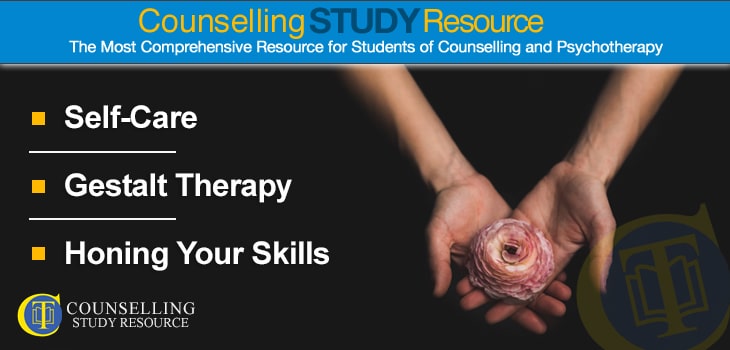016 – Self-Care – Gestalt Therapy – Honing Your Skills – Personal Change and Relationships
In episode 16 of the Counselling Tutor Podcast – which marks the season 1 finale – Rory Lees-Oakes and Ken Kelly discuss self-care for counsellors. Rory gives an overview of gestalt therapy, while Ken speaks about how you can sharpen your skills. The episode ends with a debate about how we grow as counsellors during training, and the potential effect on our relationships.
Self-Care for Counsellors
Counselling is a demanding occupation, as we give so much of ourselves in the therapeutic relationship, being fully present with every client through some harrowing experiences. It is important to ensure we care for ourselves; without doing so, we become unable to care for others. It is vital to avoid burn-out.
Ken and Rory describe how they and others practise self-care, including going to supervision, journaling, escaping from IT, enjoying the outdoors, and having a change of scene through going away. If you are taking a holiday, this is a kind of ending; it is important to deal with this appropriately.
Gestalt Psychotherapy
‘Gestalt’ is a German word, which has no direct translation, but generally refers to a whole, circle, completion or connection. Gestalt therapy is all about connecting with ourselves both emotionally and physically.
Developed by Fritz and Laura Perls, gestalt therapy was one of the modalities featured in Everett Shostrom’s ‘Three Approaches to Therapy’ – or, as they are more commonly known, ‘the Gloria Films’. Perls’ session with Gloria is confrontational, which is a key element in this modality, though this now tends to take a more gentle form.
Gestalt shares its emphasis on phenomenology and the here-and-now with person-centred counselling, but pays more attention to the physical manifestations of our emotions. Rory illustrates this with examples from his experience as a counsellor. There are also influences from Freud’s psychodynamic theory, and Kurt Lewin’s field theory.
Rory provides a brief biography of the Perls, referring to the influences of psychoanalysts Karen Horney (who described a phenomenon known as ‘the tyranny of the shoulds’) and Wilhelm Reich (who also has an interesting link with cloud-busting, as described in A Book of Dreams, by his son), and of philosopher Martin Buber.
‘Mental metabolism’ suggests that we exhibit our feelings in our bodily behaviours. Being in therapy with a gestaltist (as practitioners call themselves) involves much emphasis on physical feelings and reactions. The aim is to become fully aware of our whole body process, when faced with different situations.
Rory provides an example of how we as humans are moved to take action in order to return ourselves to a state of ‘equilibrium’, completing a ‘gestalt’. ‘Co-creation’ is about being in the client’s frame of reference and ensuring the client is taking control of therapy and their life. Rory also explains other key terms from gestalt therapy – introjection, projection, retroflection, deflection and confluence.
Taking Skills to the Next Level
Ken outlines some ideas about how we can hone our counselling skills when we bring them all together in the counselling room.
Carl Rogers believed that the richest learning could be gained from listening back to skills sessions. This holds true today, and taping sessions (with the client’s permission) is invaluable. You are listening not for what the client is bringing, but for how you are responding to this:
- Can you name the skills you are using?
- What effects do these have on the client?
- What could you have done differently?
It can be really useful to bring all this knowledge together into a master skills list. For each skill, include a definition and describe the effect on the client. This can be a great learning tool, to refer back to time and time again.
Personal Change and Relationships
How can the personal change we experience when we go through counselling training affect our relationships? This can be a turbulent time, as we struggle with how to relate to others (partners, friends, relatives, employers or colleagues) who may try to impose their frame of reference on us, be at odds with our way of being, or fail to acknowledge our needs. Sometimes, others can change with us – we can ‘renegotiate the contract’ – but in other cases, we face the choice of reducing or even severing contact with them. This is not easy, and takes significant courage.


